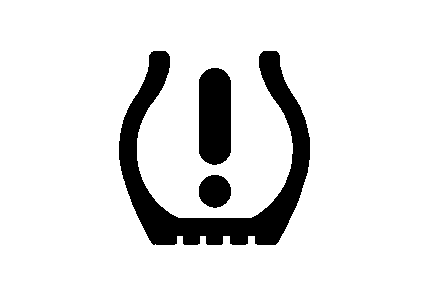Your vehicle may have the Tire Inflation Monitor System (TIMS). The system is designed to alert the driver when there is a large air pressure change in one tire, while the vehicle is being driven. TIMS detects differences in tire rotation speeds that are caused by changes in tire pressure. The system can alert you about a low tire but it does not replace normal tire maintenance. See Tires . The TIMS learns the pressure at each tire throughout the operating speed range of the vehicle. The system normally takes between 45 and 90 minutes of driving to learn the tire pressures. This time may be longer depending on individual driving habits. Learning need not be accumulated during a single trip. Once learned, the system will remember the tire pressures until the system is reset.

This symbol, along with the CHECK TIRE PRESSURE warning message, will appear in the Driver Information Center (DIC) if the pressure in one tire becomes 12 psi (83 kPa) lower than the other three tires.
See DIC Warnings and Messages for more information.
The tire inflation monitor system will not alert you if the pressure in more than one tire is low, if the system is not properly calibrated, or if the vehicle is moving faster than 70 mph (110 km/h).
When the CHECK TIRE PRESSURE warning message comes on, stop as soon as possible and check all the tires for damage. If a tire is flat, see If a Tire Goes Flat . Also, check the tire pressure in all four tires as soon as possible. See Inflation - Tire Pressure .
The CHECK TIRE PRESSURE warning message will also be displayed, while the ignition is on, until the system is reset. To reset the system, see "Tire Inflation Monitor System" under the options mode in DIC Controls and Displays .
Do not reset the tire inflation monitor system without first correcting the cause of the problem and checking and adjusting the pressure in all four tires. If the system is reset when the tire pressures are incorrect, the system will not work properly and may not respond when a tire is low.
The tire inflation monitor system will need to be reset any time a tire's pressure is adjusted, the tires are rotated, or one or more tires is repaired or replaced. The system will also need to be reset when new tires are purchased for the vehicle and when the battery has been disconnected.
